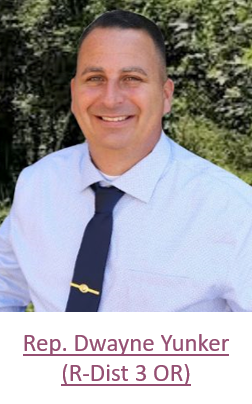Election Fallout in Higher Education
The impressive victory of president-elect Donald J. Trump and running mate J.D. Vance is being roundly applauded by those who support the moral crusade to rebuild and restore America. But their opponents are not taking the election results well, and nowhere is this more evident than in academia, where liberal professors are in the majority and college students are melting down.
The College Fix chronicled the fallout in the wake of November 5 that demonstrates the challenges the new Trump Administration will face in, among other places, the realm of higher education. The good news is while college-age voters favored Kamala Harris, it was by a smaller margin than those who voted for Biden in 2020.
 Perhaps most egregious of the post-election rhetoric aimed at Trump voters came from Leonard Serrato, a University of Oregon administrator, who expressed openly in a video posted to his Instagram account that he “wished Trump supporters would (expletive) kill themselves.” Micaiah Bilger, assistant editor of The College Fix, reported that Serrato’s video included other obscene and derogatory statements against Trump voters. He admitted to being “a very petty person” and said he “loves that” about himself.
Perhaps most egregious of the post-election rhetoric aimed at Trump voters came from Leonard Serrato, a University of Oregon administrator, who expressed openly in a video posted to his Instagram account that he “wished Trump supporters would (expletive) kill themselves.” Micaiah Bilger, assistant editor of The College Fix, reported that Serrato’s video included other obscene and derogatory statements against Trump voters. He admitted to being “a very petty person” and said he “loves that” about himself.
Donald Trump Jr. responded to Serrato’s rant on X: “[It feels] sort of ironic that the guy that runs fraternity and sorority life at University of Oregon probably could have never gotten into a fraternity. It’s disgusting, but not surprising, that an employee at a state University would speak this way about MORE THAN HALF of the country.”
Oregon Representative Dwayne Yunker (District 3) posted that he is reaching out to the university and “demanding they inform all tuition payers of this incident, in order to prevent a possible social contagion public health crisis. This will also be brought up when the University of Oregon requests their budget from the legislature,” he wrote.
Affirming student meltdowns
When the Trump victory became official, many colleges canceled classes over their students’ “trauma,” grief, and devastation. College Fix editor Jennifer Kabbany reported that these tantrum-affirming universities included Harvard, the University of Pennsylvania, Columbia/Barnard, Michigan State University, Ohio University, Swarthmore College, and others. The messages Kabbany received from professors responding to her requests for comment generally expressed a desire to allow students a respite to assuage their grief, fear, and uncertainty of “how to go on.”
Media personality Eliana Goldin observed on X that Columbia professors canceled classes or eased course requirements in the wake of Trump’s win, but that “Jews endured calls for their genocide day and night last semester, and Columbia did nothing. Half the country votes for a candidate and Columbia elitists can’t deal.”
Kabbany quoted Ohio University Professor Amy Chadwick, who canceled her communications class “to give space to those who are devastated by the election results.” Chadwick wrote in a memo: “For those of you who are scared, traumatized, angry, etc., please know that you are not alone. There are resources available to help support you and there are pathways forward....” She then pointedly addressed students who may have dared to support Trump: “I know not everyone is upset at the results and I hope we can be gentle with each other today rather than create division.” The obvious question for Trump supporters was who exactly was creating the “division”?
In addition to canceling classes, an article by The Daily Caller News Foundation described how institutions of higher education “are decrying President-elect Donald Trump’s victory and offering a swath of therapeutic safe-space activities to help students cope with their emotions.”
According to an email from a “director for student success” at Michigan State University, the school offered students a “safe space” that included “therapy dogs, coloring books, and free hugs.” The political science department hosted a “post-election debrief and offered counseling resources for students.” The university’s Counseling and Psychiatric Services created an “election care kit” with “coping tips” such as telling students to “connect with nature and take breaks from media consumption.”
At the University of Buffalo, students were given an opportunity to “share how they have been emotionally and psychologically impacted by the election,” and Georgetown University offered a “Self-Care Suite” that provided allegedly traumatized students with milk and cookies, coloring books, and Legos.
Trump’s campaign promises for higher education
The president-elect has promised to “reclaim our once great educational institutions from the radical Left,” as well as abolish the U.S. Department of Education and keep men out of women’s sports. He also wants to crack down on DEI and antisemitism. While all these are tall orders, Trump showed during his first term that he keeps his promises. (See the book, Top 100 Trump Promises Made, Promises Kept (Amazon.com) for an easy-to-read synopsis of Trump’s first-term accomplishments — Ed.)
 Kabbany reported that Trump is further expected to “roll back the Title IX changes” made by the Biden Administration, as well as remove the specter of student loan forgiveness. She wrote that he “has also proposed the creation of a free online college funded through a tax on large private university endowments. The so-called ‘American Academy’ would allow students to transfer previous coursework,” and “would not allow ‘wokeness’ — a common conservative complaint of traditional colleges.”
Kabbany reported that Trump is further expected to “roll back the Title IX changes” made by the Biden Administration, as well as remove the specter of student loan forgiveness. She wrote that he “has also proposed the creation of a free online college funded through a tax on large private university endowments. The so-called ‘American Academy’ would allow students to transfer previous coursework,” and “would not allow ‘wokeness’ — a common conservative complaint of traditional colleges.”
As for campus protests, a Trump Administration “may use accreditation” to strengthen protections for Jewish students. While the pro-Hamas demonstrations and their overall level of violence seem to have subsided at least for now, antisemitic activities continue. Just this month, two Jewish students at DePauw University in Chicago were attacked by masked men on the Lincoln Park campus, presumably for displaying a sign inviting other students to engage in conversation about Israel.
NBC Chicago reported that the students were targeted and that their injuries included “a concussion and a fractured wrist.” The attack took place “in front of the university’s Student Center” and left one student unconscious. NBC reported that that after the attackers ran off, passersby told the victims “you got what you deserved.”
Vows to resist
Even more frightening is the mood of academic leaders and professors on many campuses, who are vowing to, as The Daily Caller puts it, “stand up against” the incoming administration. These leaders are fearful of higher education budget cuts and are promising to defy “future immigration policy.” How they will do this is unclear, but Wesleyan University President Michael S. Roth provided a clue by stating that the school would not “voluntarily assist in any efforts by the federal government to deport our students, faculty or staff solely because of their citizenship status.” He promised to double down on the university’s DEI efforts and reject “the cultivated ignorance that is used to fan the flames of hatred,” which critics charge is exactly what DEI does.
Echoing the anti-Trump frenzy in higher education are the many teachers and administrators in K-12 schools who have come out of the woodwork to threaten the president-elect and his supporters. Libs of TikTok said they received so many examples of outraged lunacy that they could scarcely document them all.
 A common report was of liberal women shaving their heads “to fight the patriarchy, and threatening to shoot white men on sight because Trump was elected.” Such theatrics might seem amusing and even laughable if they did not include teachers who are brainwashing children with their out-of-control bias and hatred.
A common report was of liberal women shaving their heads “to fight the patriarchy, and threatening to shoot white men on sight because Trump was elected.” Such theatrics might seem amusing and even laughable if they did not include teachers who are brainwashing children with their out-of-control bias and hatred.
In one Libs of TikTok example, Annie Dunleavy, a special education teacher at Chapman School in Connecticut, posted a video online “threatening to kill and hurt Trump supporters.” When her video became public, she was removed from the school and the superintendent announced an investigation into her threats, but she is hardly an aberration.
Instagram personality Donald Jeffries, author of the "I Protest" series on Substack as well as six books, wrote on November 18 that the postings on TikTok and Instagram reveal what he calls “America 2.0’s shocking level of insanity.” He opined: “If you watch those TikTok and Instagram videos — and there [is] an endless supply of them — you will see the face of the enemy. The angry, screaming, nose-ringed, tattooed, sometimes purple or green haired enemy.” While he acknowledged that this “Army of the Unbalanced” consists mostly of white females, “they are a very loud minority,” and they “are threatening violence.”
Jeffries pointed out the hatred these women have for white men, and noted that while stable people view them as crazy, the potential harm they could inflict on their own children or those they teach in the schools, as well as on the culture in general, is considerable. “We are at war” he charged.... “When you have appreciable numbers of women in your society expressing irrational hatred for males in general, you have lost the basis for that society.”
He further posits that if Mr. Trump “unleashes RFK, Jr. on the Medical Industrial Complex, deports millions, allows [the attorney general] to actually prosecute some Swamp creatures, this will only widen the gap between those who are clinging to sanity, and the lunatics who were never committed to an asylum to escape from.”
Observers hope Jeffries is wrong and that the new Trump Administration will instead be able to unite the country and restore sanity to America’s institutions, starting with the schools.
Want to be notified of new
Education Reporter content?
Your information will NOT be sold or shared and will ONLY be used to notify you of new content.
Click Here
Return to Home Page
